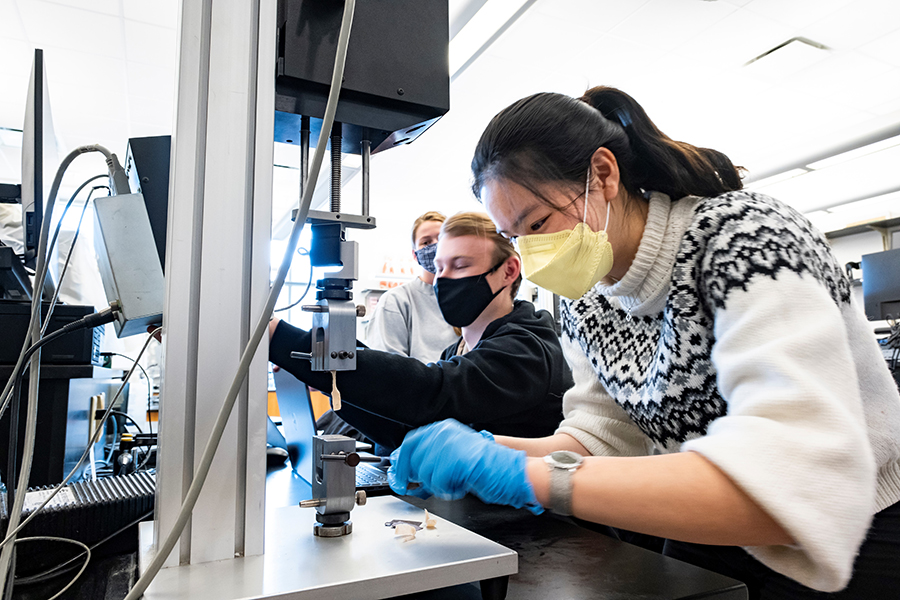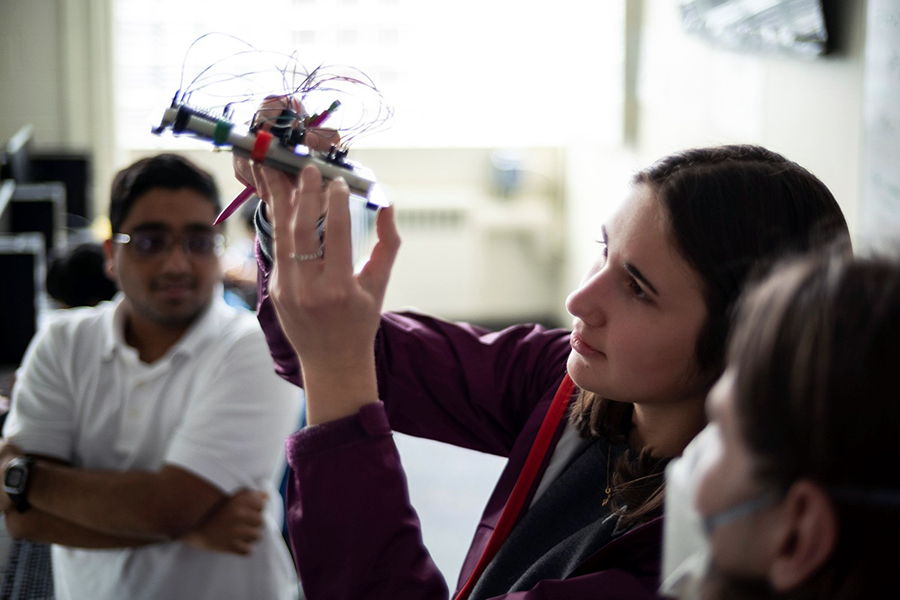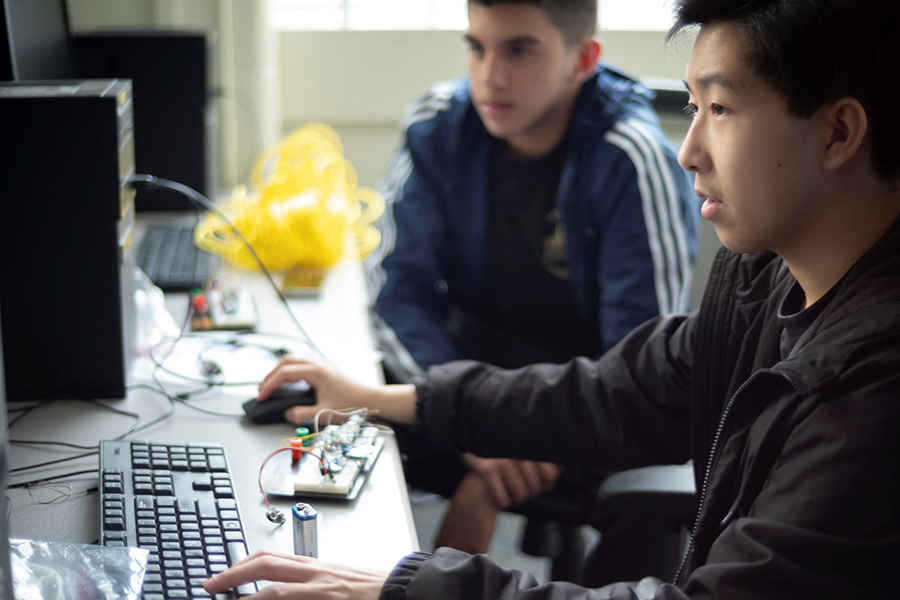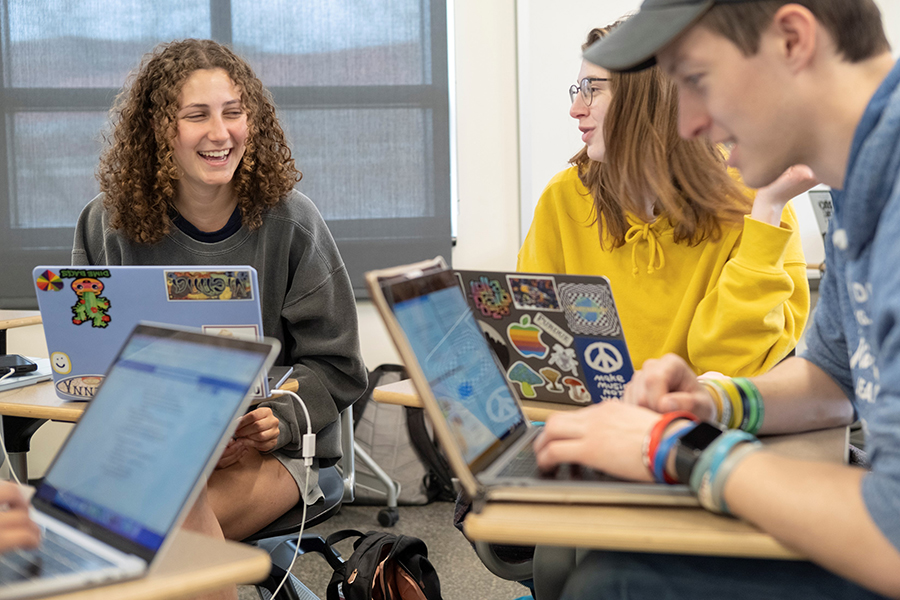Agile Reform of Curriculum moves forward

Agile Reform of Curriculum (ARC) is designed to stimulate learning innovations and support frequent (re)development of undergraduate curricula based on feedback from students and employers.
The College of Engineering program seeks to catalyze ideas that can be piloted within an academic year including significant revamping of a specific required course sequence. ARC uses efficiencies across courses to reduce the number of classes taught while adding flexibility for students to engage in experiential learning, introducing new concentrations, minors and certificates in response to rapid technological advancements and societal changes affecting the future STEM workforce. The first four ARC projects launched in 2021 in different areas of Purdue Engineering aim to increase the depth of training in industry-ready competencies for students.
Alina Alexeenko, associate dean for undergraduate education, said, “We are taking an approach to curriculum that has driven high-speed innovation in tech with emphasis on supporting teams of faculty across disciplines and collaboration with learners and industry to enable a rapidly evolving curriculum that equips students for life.”
Remapping biomedical engineering pathways
Recent events, including the worldwide pandemic, have reinforced the need for a diverse and well-trained biomedical engineering workforce. In response, the Weldon School of Biomedical Engineering (BME) is implementing significant curriculum reforms.
The Weldon School has increased undergraduate enrollment by 50% over the last two years, while simultaneously implementing an Agile Reform of Curriculum over the next three years. Beginning last year, BME embarked on a complete redesign of the undergraduate curriculum. The goal is to maintain the School’s unique balance of teaching fundamental engineering knowledge and hands-on and experiential training, while simultaneously increasing training and skill-set attainment in specialized areas of biomedical engineering. To do this, the School introduced the concept of a “Pathways” curriculum. All students will take the same foundational courses in their sophomore year and begin specialization in their junior year by declaring a BME specialization (Bioelectronics and Bioinstrumentation, Bioimaging, Engineering Biomechanics and Biomaterials, or Quantitative Biomedicine). Students will be required to complete two Pathway-specific courses to learn the fundamentals of their area of BME specialization. Students also will be required to complete one of the courses in a different BME Pathway to maintain the breadth of their training.
A broad approach has been taken to increase the quantitative and computational competency of students. Generally, BME undergraduate students have reported being limited in their programing skills, so programing requirements will now include CS 190 - Introduction to Python Programing, and Cybernetics, a new BME 200-level course with a focus on Python programing. Additionally, the College is reinforcing students’ programing skills by introducing Python programing throughout the curriculum by implementing the use of Google Colab and Jupyter notebooks in a wide range of sophomore- and junior-level courses.
The new undergraduate curriculum will increase depth of training in specialized areas of BME, improve student identity, and allow for earlier focus on a sub-field of BME and greater flexibility for students.
Electrical and Computer Engineering offering AI/ML and semiconductors minors for all
In response to a growing interest from students, Purdue’s Elmore Family School of Electrical and Computer Engineering (ECE) will offer a minor and concentration in artificial intelligence/machine learning (AI/ML) and a new minor and concentration on semiconductors and microelectronics.

The AI/ML minor will launch for the Fall 2022 semester. Courses for the minor will be open not only to students in the College of Engineering but also to non-Engineering majors. In tandem, the School will add related concentrations for students pursuing the BSEE and BSCmpE degrees.
The plan for the minor is to have one baseline course — the popular “Python for Data Science” class that teaches basic programming as well as provides the mathematical foundations for AI and ML. In addition, there will be a selection of five core courses from which students may choose, allowing them to focus on the computational side of AI/ML, the mathematical side, or both. In addition, there will be a selection of electives available.
The School intends to offer the new concentration on semiconductors and microelectronics for graduate students pursuing the MS ECE degree. It will be available both on campus and online. A unique feature of the master’s program is a suite of 1-credit courses developed to meet the needs of potential students and their prospective employers. This new MS degree will be the only interdisciplinary MS degree focused entirely on this area at any of the top 10 ranked engineering colleges in the country.
In addition, a new undergraduate minor and undergraduate concentration in semiconductors and microelectronics will be formally available in August 2022. The minor will allow non-ECE students to gain a fundamental understanding of semiconductors and microelectronics and also deepen their studies with electives in this same topic. The undergraduate concentration will allow undergrads pursuing Electrical or Computer Engineering majors to tailor their undergraduate experience to specialize in the areas of semiconductor technology, circuit design, or system design.
These credentials provide an important signal to employers and graduate schools about the depth and focus of a student’s undergraduate studies. Employers are looking for people who can deploy AI/ML methods across many fields. In addition, huge industry investment has been made in semiconductor and microelectronics infrastructure, and the College must provide the skills for the next generation of engineers and scientists in these areas.
Data science labs
A series of undergraduate data science laboratories that relate to courses taken by all students in the College of Engineering are being developed by faculty in ECE.

Each lab will be a 1-credit course that Engineering students can take, either in parallel with, or subsequently to, an existing required/elective STEM course. The labs will link material already covered in the curriculum with applications in data science. They will also teach students how to program in Python as well as how to use Arduino to acquire data. By carefully grafting the laboratory experiments onto existing courses in a cohesive fashion, the series of labs will provide a lean and effective way for Engineering students to develop a practical data science expertise while gaining valuable coding experience and developing a familiarity with the use of embedded systems.
Each lab will consist of a weekly, 150-minute, in- person session. The lab material will be presented within an interactive notebook written in Jupyter. This will allow students to read summaries of the relevant theoretical material, run demonstration experiments, and receive instructions before writing their own code to acquire and analyze data. The use of Arduino sensors and embedded systems will provide an easy “plug-and-play” way for students to construct the hardware needed for data acquisition.
Each section will be capped at 20 students and supervised by undergraduate teaching assistants (TAs). The grade will be based entirely on the Jupyter lab reports, which will be completed in class with the TAs’ assistance. Honors credit will be available. Students successfully completing a lab will be eligible to apply for an undergraduate teaching position in subsequent semesters.
The first lab, associated with Calculus 2, is currently being offered as an experimental course. The second lab, associated with Calculus 3, will be offered for the first time in Fall 2022. Development of future labs on Signals and Systems (ECE301) and Probability (ECE302) is ongoing.
Rethinking sophomore year in environmental and ecological engineering
Most Environmental and Ecological Engineering (EEE) courses are only taught once per year, with minimal instructor overlap. This creates challenges in the agility of the program to respond to changing needs of students, to accommodate new opportunities for students and faculty, and potentially in the overall time to degree for students.

EEE is proposing an agile reform of selected core courses that will maintain timeliness to degree and enhance flexibility to allow students to “do more in four.” The proposed reform will reinvent the sophomore year by examining, redesigning, and cohesively integrating three courses: EEE 250 (Environmental, Ecological and Engineering Systems); EEE 300 (Environmental and Ecological Systems Modeling); and EEE 430 (Industrial Ecology and Life Cycle Analysis). The outcome of the reform will translate nine required credits (three courses) into six sophomore modules that can be completed in two consecutive semesters regardless of the student start point.
Additionally, with the recovered three credits, EEE will introduce an elective category that is required to be fulfilled with experiential learning coursework (e.g., Vertically Integrated Projects, Study Abroad, global competencies, or service learning). It’s anticipated that by modularizing these courses, more instructors will be able to rotate into teaching portions of the sophomore year, providing a breadth of exposure of faculty to students. This will also allow faculty to devote recognized teaching effort to the development and execution of experiential courses and other advanced technical electives.
These experiences form collaborative partnerships with practitioners and community members toward solving real- world problems through creativity, community engagement, negotiation and consensus building, as well as compromise. They also highlight the ways in which technological solutions intersect with socio-environmental justice and how these issues affect a variety of interest groups.
